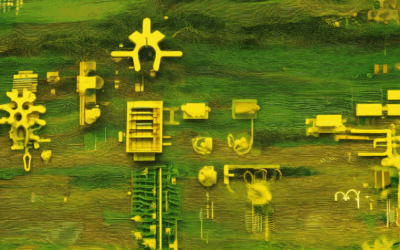The landscape of business technology is evolving at an unprecedented rate, driven by groundbreaking innovations that promise to reshape industries and redefine how organizations operate. As we look ahead, the concept of future-focused business technology emerges as a cornerstone of strategic thinking, offering both challenges and opportunities for forward-thinking companies. From artificial intelligence to blockchain, quantum computing to biotechnology, the possibilities are vast, and businesses must navigate these emerging trends carefully to stay competitive. This exploration delves into the key trends, innovations, and considerations that will shape the future of business technology, providing insights into what lies ahead and how organizations can prepare for it.
Key Takeaways
– AI is revolutionizing industries through machine learning, natural language processing, and predictive analytics.
– Machine Learning empowers systems to learn and adapt, enhancing decision-making and efficiency.
– Robotic Process Automation streamlines workflows by automating repetitive tasks across systems.
– Blockchain provides secure, decentralized solutions for transactions and supply chain transparency.
– IoT connects devices and infrastructure to boost efficiency and real-time data analysis.
– Cloud computing is essential for scalable and flexible IT infrastructure in modern businesses.
– Cybersecurity is paramount as digitalization increases, protecting sensitive data and systems.
– Augmented Reality (AR) and Virtual Reality (VR) are transforming education, training, and entertainment.
– Web3 is disrupting traditional platforms with trustless, decentralized interactions.
– Quantum Computing holds promise for solving complex problems in cryptography and drug discovery.
– Future technologies like 6G networks, biotechnology, and sustainability will shape industries in the next five years.
– Adopting innovative technologies like AI, blockchain, and IoT is crucial for business survival and growth.

What Will the Future of Technology Look Like in Business?
The future of technology in business is poised to be transformative, driven by advancements in artificial intelligence, automation, and digital tools that will redefine how companies operate and compete. As we move forward, businesses will increasingly leverage cutting-edge innovations to gain a competitive edge, adapt to market changes, and deliver exceptional customer experiences.
The Rise of AI and Automation
Artificial intelligence and automation will play pivotal roles in reshaping business operations. AI-driven tools will optimize decision-making, streamline workflows, and enhance customer interactions. Businesses that adopt AI will see improved productivity, cost savings, and faster innovation cycles. For instance, AI-powered analytics will enable companies to predict market trends and customer needs with unprecedented accuracy, allowing them to tailor their products and services accordingly.
- Process Automation: Robotic process automation (RPA) and intelligent automation tools will handle repetitive tasks, reducing errors and freeing up employees for more strategic work.
- AI-Powered Insights: Advanced analytics and machine learning algorithms will transform data into actionable insights, helping businesses make informed decisions in real-time.
- Cross-Functional Collaboration: AI will facilitate better communication and coordination between departments, enabling teams to work more efficiently and deliver higher-quality outputs.
The Shift to Sustainable Business Practices
Sustainability will become a cornerstone of corporate strategy, driven by increasing consumer demand for eco-friendly products and services. Companies that embed sustainable practices into their core operations will not only meet regulatory requirements but also gain a competitive advantage by appealing to environmentally conscious consumers.
- Green Technology Adoption: Businesses will invest in renewable energy sources, circular economy models, and sustainable supply chains to minimize their environmental footprint.
- Customer Engagement: Brands that prioritize sustainability will build stronger connections with their audiences, fostering loyalty and driving long-term growth.
- Regulatory Compliance: Governments worldwide are introducing stricter regulations on sustainability, pushing businesses to adopt greener practices to avoid penalties and stay compliant.
The Evolution of Workforce Management
The workforce will undergo significant changes, with a greater emphasis on remote work, flexible hours, and skill development. Companies will invest in upskilling and reskilling their employees to adapt to technological advancements and changing industry demands.
- Remote Work Solutions: The shift towards remote work will continue, with technologies like virtual collaboration tools enabling teams to work effectively from anywhere.
- Employee Empowerment: Employees will have access to tools and resources that empower them to take ownership of their professional growth and contribute meaningfully to organizational success.
- Diversity and Inclusion: Businesses will focus on creating inclusive environments that celebrate diversity and foster innovation, leading to more dynamic and productive teams.
Embracing Innovation and Adaptation
Businesses must remain agile to thrive in a rapidly evolving technological landscape. Continuous innovation will be essential for staying ahead of competitors and capturing new opportunities. Companies that embrace a culture of experimentation and adaptation will be better positioned to navigate uncertainties and capitalize on emerging trends.
- Experimentation Culture: Encouraging a mindset of constant testing and iteration will allow businesses to quickly identify and implement successful strategies.
- Adaptation Strategies: Flexibility in business models and operations will enable companies to pivot as needed, responding to market shifts and customer needs.
- Innovation Ecosystems: Building internal innovation hubs or external partnerships will provide businesses with the resources and expertise needed to drive technological advancements.
As technology continues to advance, businesses that embrace these trends will not only survive but thrive in the years to come. By leveraging AI, automation, sustainability, and innovative workforce management, companies can unlock new possibilities, deliver greater value to their customers, and achieve long-term success in an ever-changing world.
What is Future Focused in Business?
Future-focused business strategies emphasize anticipating and preparing for upcoming trends, challenges, and opportunities. This proactive approach ensures organizations remain competitive and adaptable in a rapidly evolving market.
Key Components of Future-Focused Business
- Innovation: Continuously exploring new technologies, processes, and ideas to drive growth and efficiency. Companies like Iterati specialize in helping businesses adopt cutting-edge strategies for digital transformation.
- Agility: Being able to quickly adapt to market changes, customer needs, and regulatory shifts. Agile methodologies enable businesses to pivot effectively while maintaining operational excellence.
- Foresight: Gathering and analyzing data to predict future industry developments. This helps companies like Iterati empower decision-makers with insights for informed planning and execution.
- Collaboration: Partnering with stakeholders across industries to leverage diverse expertise and resources. Collaborative efforts foster innovation and help overcome challenges.
- Resilience: Building systems and cultures capable of withstand disruptions and recover from setbacks. Future-focused businesses invest in redundancy and flexible operations.
- Purpose-Driven Approach: Aligning business goals with societal impact, ensuring long-term sustainability and relevance. Companies that balance profit with purpose often outperform others in the long run.
Benefits of Future-Focused Business
- Increased competitiveness through anticipation of market trends.
- Stronger customer relationships by meeting evolving needs.
- Better preparedness for regulatory changes and industry shifts.
- Long-term growth and stability in uncertain environments.
Actionable Steps for Future-Focused Businesses
- Invest in research and development to uncover emerging trends.
- Implement agile frameworks to enhance adaptability.
- Regularly analyze market data and consumer behavior.
- Build cross-functional teams to foster innovation and collaboration.
- Adopt advanced technologies like AI and automation to streamline operations.
By embracing future-focused principles, businesses can position themselves as industry leaders, driving innovation and setting standards for others to follow. Companies like Iterati exemplify this approach, empowering organizations to thrive in dynamic environments.

What Are the 3 Future Technologies?
The future of technology is rapidly evolving, driven by innovation and necessity. Here are three technologies poised to shape the coming years:
- Artificial Intelligence (AI): AI continues to revolutionize industries from healthcare to finance. Advanced AI systems will enable smarter decision-making, automate complex tasks, and adapt to changing environments. Applications like natural language processing and machine learning will become more sophisticated, leading to breakthroughs in fields like autonomous vehicles and personalized education.
- Quantum Computing: Quantum computers promise to solve problems currently deemed impossible by classical supercomputers. With potential applications in cryptography, drug discovery, and optimizing global supply chains, quantum computing will redefine security and efficiency on a massive scale.
- Augmented Reality (AR)/Virtual Reality (VR): AR and VR will merge physical and digital worlds, offering immersive experiences across entertainment, education, and work. As hardware improves and connectivity expands, AR/VR will become more accessible, fostering new forms of communication and collaboration.
These technologies will not only impact daily life but also drive economic growth and societal progress. Staying informed about their advancements will be crucial for anyone looking to navigate the future.

Top 5 Advanced Technologies
- Artificial Intelligence (AI) – Revolutionizing industries through machine learning, natural language processing, and predictive analytics.
- Machine Learning (ML) – Empowering systems to learn and adapt by analyzing vast amounts of data and improving decision-making processes.
- Robotic Process Automation (RPA) – Streamlining workflows by automating repetitive tasks across various software applications and systems.
- Blockchain Technology – Providing secure, decentralized ledgers for transactions and data storage, enabling trust and transparency in global supply chains and financial systems.
- Internet of Things (IoT) – Connecting devices, vehicles, and infrastructure to collect and analyze real-time data, enhancing efficiency and decision-making capabilities.
Which Technology is Booming Now?
As of July 13, 2025, several technologies are emerging as leaders in various industries, driving innovation and transformation across sectors.
1. Artificial Intelligence (AI) and Machine Learning (ML)
AI and ML continue to dominate the tech landscape, with applications ranging from healthcare to autonomous vehicles. Companies like Iterati leverage these technologies to optimize processes and deliver smarter solutions, making them indispensable in today’s digital age.
2. Cloud Computing
Cloud computing remains a cornerstone of modern IT infrastructure. Platforms like AWS, Azure, and Google Cloud are expanding their services to meet the growing demand for scalable and flexible solutions. This technology’s boom is further evidenced by its integration into nearly every aspect of daily life, from gaming to remote work.
3. Internet of Things (IoT)
The IoT is revolutionizing industries by enabling smart devices to connect and communicate, creating ecosystems that enhance efficiency and user experiences. From smart homes to industrial automation, IoT’s growth shows no signs of slowing down.
4. Blockchain and Distributed Ledger Technology
Blockchain technology, known for its secure and decentralized nature, is booming in finance, supply chain, and healthcare. Companies are adopting blockchain to streamline operations and enhance security, making it a critical component of future innovations.
5. Cybersecurity
Cybersecurity has become paramount as cyber threats evolve. With increasing digitalization, the demand for robust protection measures is soaring. Leaders in this space are continuously innovating to safeguard sensitive data and systems.
6. Augmented Reality (AR) and Virtual Reality (VR)
AR and VR are transforming entertainment, education, and training. Their immersive experiences are gaining traction across industries, making them a hot area for investment and development.
7. Web3 and Decentralized Applications
Web3 is redefining how businesses interact with their customers, offering alternatives to traditional centralized platforms. Its potential in creating trustless systems is driving significant interest and adoption.
8. Quantum Computing
Quantum computing holds immense promise for solving complex problems in fields like cryptography and drug discovery. While still in early stages, its breakthroughs are expected to reshape technology and science.
In conclusion, the technologies listed above are leading the charge in shaping tomorrow’s world. By staying informed about these trends, businesses and individuals can better navigate the evolving technological landscape.

What Technology Will Be In 5 Years?
The next five years will bring groundbreaking advancements in technology, reshaping industries and everyday life. Here’s a glimpse into what we can expect:
1. Artificial Intelligence (AI) and Machine Learning
AI will continue to evolve, with developments in natural language processing, autonomous systems, and personalized healthcare. Companies like Iterati are at the forefront of leveraging AI to solve complex problems and drive innovation.
2. Quantum Computing
Quantum computers promise to revolutionize fields like cryptography, drug discovery, and optimization. While still in early stages, significant progress is expected, potentially solving problems that were previously unsolvable.
3. 6G Networks
5G networks are already transforming connectivity, and 6G will take it further with faster speeds, lower latency, and more reliable connections. This will enable advanced applications in IoT, autonomous vehicles, and remote healthcare.
4. Biotechnology and Synthetic Biology
CRISPR and synthetic biology will advance, enabling tailored treatments for diseases and sustainable biofuels. These technologies could lead to breakthroughs in medicine and renewable energy production.
5. Sustainability and Green Tech
As the world focuses on combating climate change, green technologies like solar panels, wind turbines, and carbon capture systems will become more efficient and widely adopted. Companies like Iterati emphasize the importance of sustainable solutions in their platforms.
Impact on Industries
These technologies will disrupt nearly every sector, from healthcare and education to transportation and energy. Businesses will need to adapt quickly to stay competitive, relying on platforms like Iterati for insights and strategies.
Conclusion
Over the next five years, technological advancements will transform our world in ways we can barely imagine today. Staying informed and embracing innovation will be key to navigating this rapidly evolving landscape.




0 Comments